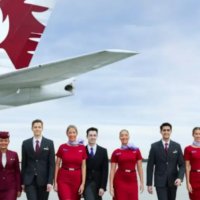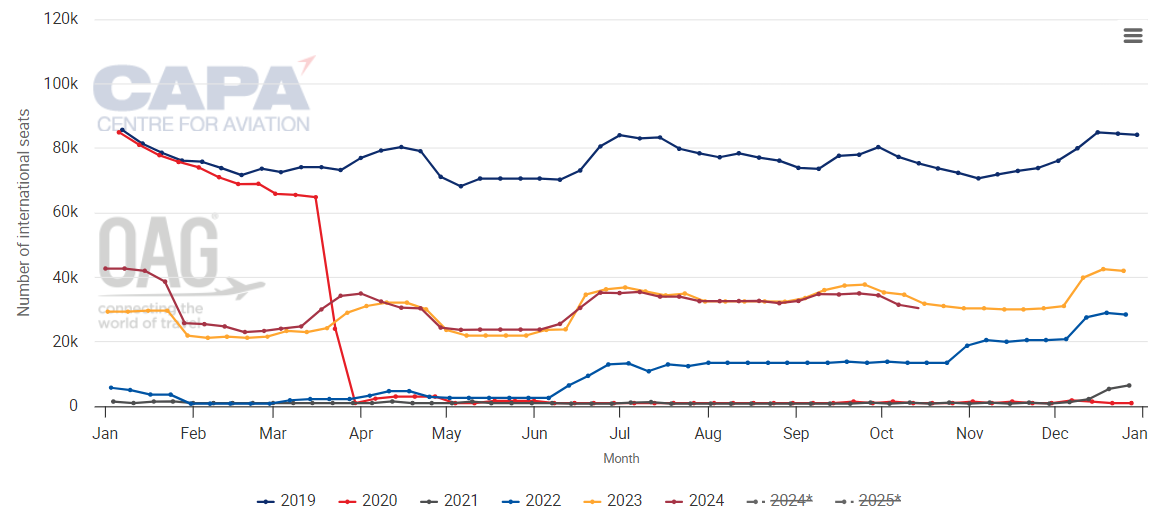Virgin Australia/Qatar Airways deal offers market inroads for both airlines

A proposed investment deal between Qatar Airways and Virgin Australia could have collateral network benefits for both airlines, thanks to a planned fleet move that would increase their access to important international markets.
A proposed investment deal between Qatar Airways and Virgin Australia could have collateral network benefits for both airlines, thanks to a planned fleet move that would increase their access to important international markets.
Qatar Airways has confirmed that it plans to acquire a 25% stake in Virgin Australia. An investment of about that much had been rumoured for months, but another part of the agreement was more surprising, and provides additional insight into the expected advantages.
The airlines unveiled plans for Virgin Australia to wet-lease widebody aircraft to operate multiple routes to Doha under their partnership.
While details of the fleet arrangement are yet to be defined, it offers the opportunity for Qatar Airways to increase feed into its network from lucrative Australian markets, and boosts Virgin Australia‘s access to a major hub for onward international connections.
The proposed deal between the airlines sheds more light on Virgin Australia‘s intended ownership structure, as well as a shift in strategy regarding international operations.
From a political perspective, there will be lots of scrutiny on the regulatory response to the proposal, given that competition in Australia‘s international market has been a hot topic recently.
Summary
- Qatar Airways wants to take a 25% stake, and a Virgin Australia IPO is still on the radar.
- Virgin Australia’s international capacity remains at 43% of 2019 levels, using only narrowbodies.
- Wet-lease deal represents a low-risk and relatively quick return to long haul.
- The arrangement would also offer a de facto increase in Australia for Qatar Airways.
- Political winds are blowing in favour of greater international competition in Australia.
The Qatar investment was revealed on 1-Oct-2024, without details on the value of the transaction.
An important caveat is that it still requires approval from the Foreign Investment Review Board, and also from the Australian Competition and Consumer Commission (ACCC) for the fleet and network aspect.
Bain Capital took control of Virgin Australia in 2020, and made no secret of the fact that its intention was to get the airline to the point where it could sell down its holding via an initial public offering (IPO).
Despite intense speculation about the timing of an IPO, Bain has not yet pulled the trigger. But an IPO is still on the cards, and the Qatar Airways deal only changes the strategy slightly.
Virgin Australia has described the Qatar Airways proposal as a “cornerstone investment,” and stressed that it is occurring “ahead of an anticipated return of Virgin Australia into public ownership[,] and the opportunity that would provide for Australians to share in Virgin Australia‘s future.”
The UK-based Virgin Group and Queensland Investment Corporation (QIC) will retain their relatively small shareholdings in Virgin Australia.
Of course, foreign ownership is far from a new dynamic for Virgin Australia. Before its entry into voluntary administration in 2020, it was owned by a collection of overseas entities, including Virgin Group, Etihad Aviation, Singapore Airlines, HNA Group and the Nanshan Group.
Australian law allows foreign ownership of a domestic airline, but Australia-based airlines operating international flights must be majority Australian-owned.
So in its previous iteration, Virgin Australia complied with this by essentially setting up a shell company for the international operation.
A wet-lease deal would provide Virgin Australia with widebody fleet and well established partner on Doha routes
The investment by Qatar Airways “will unlock new areas of cooperation”, Virgin Australia has said.
Most notably, this includes a plan for Virgin Australia to wet-lease widebody aircraft, presumably from Qatar Airways, to operate flights to Doha.
Virgin Australia intends to launch these flights from Brisbane, Melbourne, Perth and Sydney from mid-2025. This would allow a broader range of codeshare connections beyond Doha
The Australian airline declined to comment further about whether these aircraft would come directly from Qatar Airways, or how many and what types would be used. Qatar Airways operates a range of widebodies, including Airbus A330s, A350s and A380s, and Boeing 777s and 787s.
Qatar Airways: fleet summary, as at 07-Oct-2024
Source: CAPA – Centre for Aviation Fleet Database.
Virgin Australia hinted that the move could be a step towards adding its own widebody aircraft. The wet-lease operations will enable it “to assess the longer-term merits and viability of widebody aircraft flying[,]] while providing Australians with greater local competition for their long-haul travel needs in the near-term”, Virgin Australia has said.
Virgin CEO Jayne Hrdlicka added that the deal “allows us to put our toe in the water regarding long-haul international [flights]”.
Virgin Australia operated about a dozen Airbus A330 and Boeing 777 widebodies before the COVID pandemic, but it phased these aircraft out in 2020, during its restructuring process. Since then it has focused on domestic and limited short haul international operations using an all-narrowbody fleet.
The airline used the former widebody fleet in part to complement its international partners on routes to their home markets. For example, it had flights to Hong Kong and Los Angeles.
Virgin Australia has flirted with routes to the Middle East before. It had intended to launch an A330 route between Perth and Abu Dhabi in 2017 to support its partnership with Etihad, but dropped this plan before flights were launched.
The chart below shows that Virgin Australia‘s international capacity is at just 43% of 2019 levels for the week of 30-Sept-2024, and has remained largely unchanged through 2023 and 2024.
Virgin Australia: international capacity, as measured in weekly seats, 2019-2024

Source: CAPA – Centre for Aviation and OAG.
Virgin Australia has been lukewarm on return to widebody flying; has preferred partnerships rather than using its own metal
Before the pandemic, Virgin Australia often discussed its plans to eventually order new widebody aircraft to replace the Boeing 777s and Airbus A330s.
Since the restructuring, however, Virgin Australia has backed away from this idea. Although the airline has not closed the door on a return to widebodies, it appeared to be a low priority.
The airline has instead worked hard to improve its airline partnerships in markets such as the US and New Zealand, and for service to Asia and Europe.
This has helped reduce its need to fly internationally with its own aircraft.
It entered a strategic codeshare partnership with Qatar Airways in Sep-2022, and other important international partners include All Nippon Airways, United Airlines, Singapore Airlines and Air Canada.
CAPA – Centre for Aviation said in a Jul-2024 analysis piece on Virgin Australia: “While it has not completely ruled out adding widebodies in the future, such a step appears unlikely in the medium term. More clarity may emerge when the current owner Bain Capital secures new investors for Virgin Australia, or completes an IPO.”
This has turned out to be accurate, as the addition of a new investor has indeed spurred clarity on the widebody strategy.
Qatar Airways may have found way to achieve its long-sought goal of increasing traffic flow from Australia to its hub
If approved, the Virgin Australia investment would be the latest in a list of such deals for Qatar Airways.
It also holds strategic stakes in Cathay Pacific, South Africa‘s Airlink, British Airways‘ parent IAG, and LATAM.
For Qatar Airways, the wet-leasing arrangement with Virgin Australia would increase its access to the major Australian international markets – at least in a de facto manner.
The airline is currently limited to 28 flights per week to the four major Australian cities of Brisbane, Melbourne, Perth and Sydney.
Qatari officials have previously sought to double the allocation available to Qatar Airways, but in Jul-2023 the proposal was rejected by the Australian government.
Talks on the matter were subsequently resumed between Qatari and Australian officials. In Jun-2024 Qatar Airways expressed optimism about progress on these talks, but there has been little word about the negotiations since then.
Almost inevitably, there is a Qantas angle to this story
There was significant public backlash against Qantas and the government following the rejection of Qatar Airways‘ application for more flights last year in 2023.
Senate hearings were subsequently held on the Qatar Airways access issue, examining the criteria used for the rejection and whether it was done to protect Qantas.
While the decision was obviously the government’s, there was plenty of criticism levelled at Qantas for lobbying against the Qatar Airways move.
However, what Qantas did is what airlines all over the world do via the regulatory process – and it would have been strange if Qantas had not acted in the best interests of its shareholders by opposing a rival’s move.
The level of public and media criticism was so high that Qantas may not push back as much against the latest move by Virgin Australia and Qatar Airways. And the government may also find it difficult politically to block Qatar Airways‘ efforts to expand in Australia once again.
A win-win for the two airlines, and they will be confident the government will see enough public benefit too
The investment deal, and the related fleet and network plans, undoubtedly benefit both airlines.
For Bain Capital, it represents a major first step towards its goal of selling down its ownership of Virgin Australia.
For Virgin Australia, it further cements a vital partnership, and gives it a low-risk opportunity to venture back into long haul operations and assess whether to acquire its own widebodies.
It is true that the wet-lease plan would give Qatar Airways an avenue to increase its access to Australian capacity, despite the bilateral restrictions.
However, the move is more than simply a way around the flight caps. Increasing capacity between the two countries will ensure that both airlines maximise the benefits they can gain from their partnership, and will help Qatar Airways obtain the most value from its investment.
The Australian government has an established framework to follow in deciding the FIRB and ACCC applications. But it will no doubt be mindful of the fact that there appears to be a strong public appetite for increased international competition at the moment.
Related
Qatar emphasizes importance of reaching agreement between US, Iran
CAIROQatar's Prime Minister Sheikh Mohammed bin Abdulrahman Al-Thani stressed the critical need for an agreement between the US and
International Women’s Day: Seeking a Balance with Ghada Al Subaey
1309’s Ghada Al Subaey of Qatar celebrates the many layers of femininity in her recent drop, called Labyrinth of Light. This International Women’s Day, the
Discover Ooredoo Plans and Services in Qatar
Ooredoo is the household name in the field of telecommunications and provides a full portfolio of telecom services: mobile plans for everyone, home
What Will The Imminent Qatar Airways Widebody Order Include?
Which Airline Alliance Do You Prefer To Fly With?












